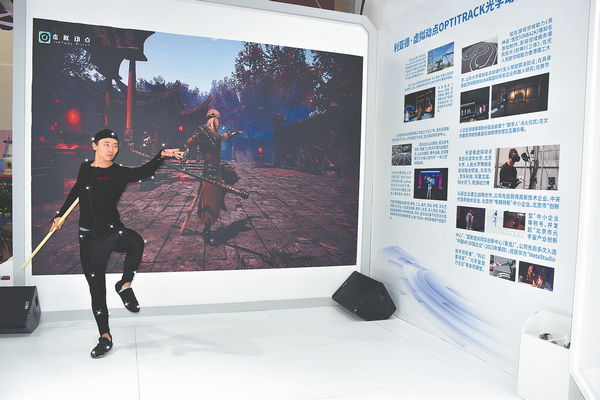Black Myth: Wukong has global gamers abuzz
China's action role play pursuit puts nation, culture on map
By Ouyang Shijia | China Daily | Updated: 2024-10-02 12:34

In a year marked by innovation, the Chinese video game Black Myth: Wukong has become a sensation, captivating gamers worldwide.
Just three days post-launch, it sold over 10 million copies, propelling it to the forefront of 2024's gaming landscape. With projections estimating total sales could reach 20 million and revenue soaring past 6 billion yuan ($854 million), the game is not just a hit — it's a cultural phenomenon.
One of the most enthusiastic voices in this wave of excitement is popular gaming YouTuber AfroSenju XL, who has gained over two million subscribers on the platform.
"Have you heard the story of a monkey born from a rock on a mountain? What about the story of the Monkey King who journeyed to find a means to beat death? We're going to learn everything about whoever this is in Black Myth: Wukong. I waited four years for a game that we weren't even supposed to get," he said in the very first video of his Black Myth: Wukong playlist on YouTube.
Known for his energetic gameplay and engaging commentary, AfroSenju dove into the new game with palpable excitement. In his latest videos, he shares his breathtaking experiences as he navigates the game's lush landscapes, battles fierce foes and unravels the narrative deeply rooted in Chinese folklore.
"This gaming is amazing, I love everything so far about it," AfroSenju exclaimed, his face lit up by the screen's glow. "Everything in Black Myth: Wukong has been legendary ... the bosses, the story…."
As he embarks on quests and encounters legendary characters from the classic Chinese tale Journey to the West, he highlights how the game modernizes this beloved traditional Chinese story and turns it into a fantasy game for global players.
The game's success signifies a pivotal moment for the Chinese gaming industry, illustrating its growing influence on the global stage. In fact, Black Myth: Wukong represents a shift in gaming narratives, merging high-quality production with cultural storytelling, showing the world that China isn't just catching up, it's leading the way.
As AfroSenju's gaming acumen garners views and sparks discussions among his followers, it is becoming increasingly clear that Black Myth: Wukong is more than just a game — it's an invitation to explore a world where ancient myths meet modern innovation. With the gaming community abuzz, this title is poised to redefine cultural exchanges in the gaming sphere, promising even greater adventures ahead.
Collin Jin, deputy president of CPA Australia's East and Central China Committee, said Black Myth: Wukong is not the first Chinese gaming product to achieve explosive success worldwide.
"Chinese games have already accounted for a significant share of global app rankings," Jin said.
In August, 34 Chinese game publishers entered their names into the ranks of the global top 100 mobile game publishers by revenue, according to data from mobile app data analytics company Sensor Tower.
The 34 publishers generated a combined revenue of $2.09 billion, accounting for 37.3 percent of the top 100. Tencent, NetEase and Century Games ranked among the top three Chinese mobile game publishers in terms of global revenue in August.
"Compared to the paths taken by Western companies in the past, the phenomenon of Black Myth: Wukong exploding in popularity reveals that many Chinese companies now possess strong comparative advantages in digitalization and intelligence applications," Jin said.
"In fields like artificial intelligence, e-commerce and electronic payments, we are relatively leading on a global scale. Given these advantageous areas and the relative homogenization of consumer preferences, Chinese companies have a solid foundation for going global in these sectors," he added.
"Since the beginning of 2023, nearly all Chinese companies around us regarded going global as a very important strategic decision. In fact, we often say within the industry that going global has become a mandatory choice, rather than an optional one. Due to China's massive production capacity, the domestic market may face consumption bottlenecks in many niche sectors. Thus a rising number of Chinese companies choose to leverage their strong production and service capabilities to explore broader markets."
























